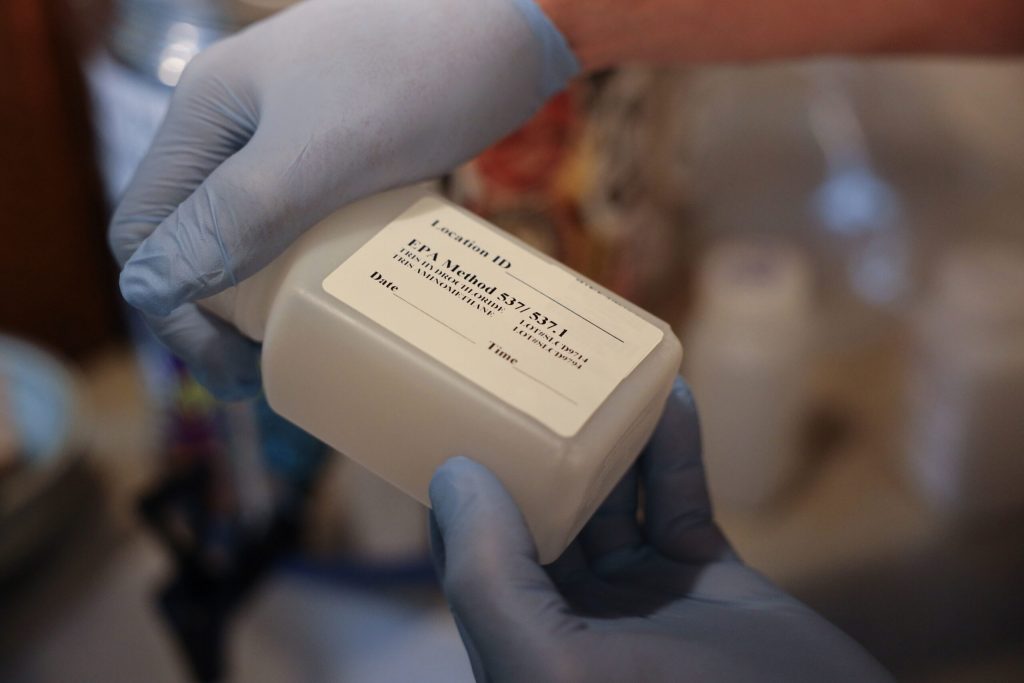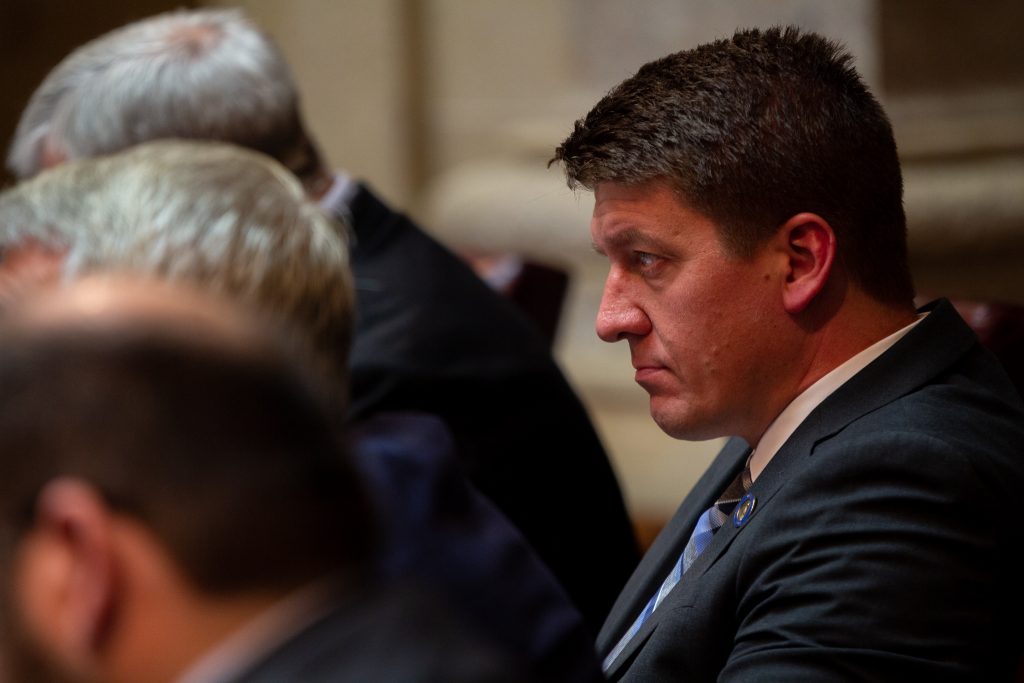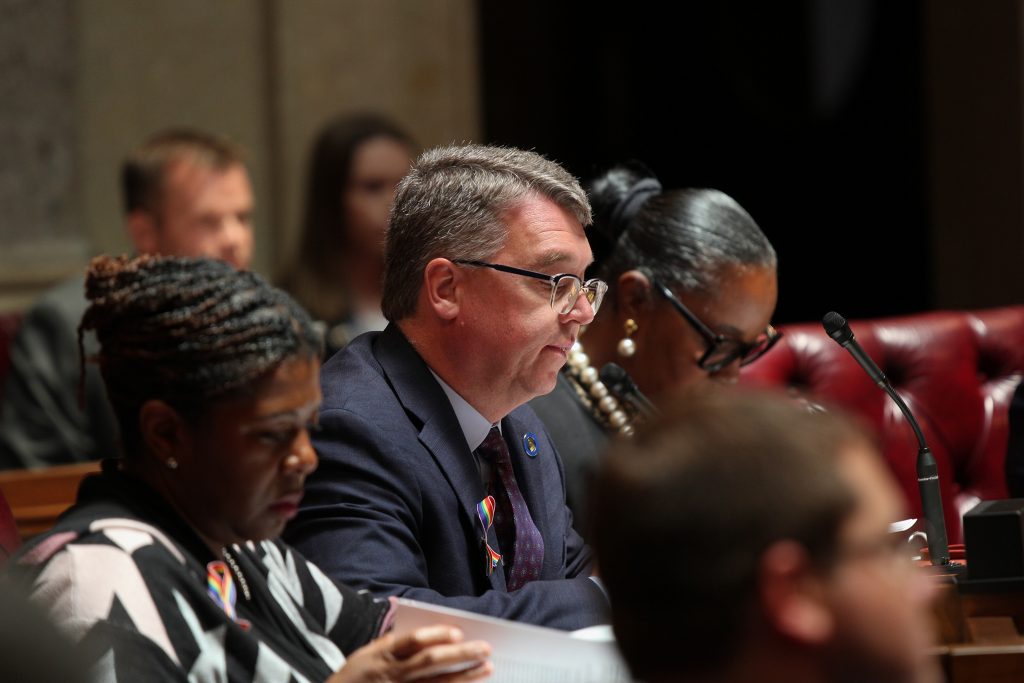Legislature Will Try Again On Regulating Forever Chemical Contamination
Communities have waited more than 500 days to access $125 million set aside for PFAS remediation.

Madison resident Brad Horn collects a water sample to test for PFAS in Madison on Aug. 8, 2022. (Coburn Dukehart/Wisconsin Watch)
Wisconsin lawmakers plan to reintroduce proposals to address PFAS contamination after bills failed in the last session.
Republican lawmakers worked with Gov. Tony Evers to set aside $125 million under the current two-year budget to address pollution from the harmful chemicals. The Democratic governor and GOP-controlled Legislature have been at odds over how to spend the funds.
“The money just needs to be focused on the actual remediation, getting people help and eliminate the liability exposure,” Wimberger told WPR.
Last year, Wimberger and GOP colleagues introduced a bill that called for spending money on grants for local governments, landowners and landfills to test wells and treatment plants for the chemicals. The proposal also would have provided grants to landowners with PFAS contamination that they didn’t cause.
In a Dec. 20 letter to Evers, Wimberger said many landowners would be deemed polluters under state law, which requires anyone who causes, possesses or controls a hazardous substance that’s been released into the environment to clean it up.
“An attempt by an innocent landowner to get clean water or help remediate pollution will financially ruin them,” Wimberger wrote. “Our laws should not make doing the right thing a life-changing dilemma for innocent parties.”

Wisconsin state Sen. Eric Wimberger, R-Green Bay, is photographed during a state Senate session on June 28, 2023, in the Wisconsin State Capitol building in Madison, Wis. Drake White-Bergey/Wisconsin Watch
In April, Evers vetoed the GOP bill over fears it would limit the authority of the Wisconsin Department of Natural Resources to require polluters to test and clean up contamination under the law.
Evers has repeatedly urged Republican lawmakers to release funds to address PFAS contamination, noting it’s been more than 500 days since the money was set aside. Sen. Brad Pfaff, D-Onalaska, said those funds should be released, noting Town of Campbell residents in his district have been relying on bottled water for almost four years.
Republican lawmakers have expressed concerns that farmers may be held liable for spreading PFAS-contaminated biosolids, or sewage sludge, on farm fields. The DNR said it has not and does not intend to pursue farmers for unintentional PFAS contamination.
In an email, a DNR spokesperson acknowledged that state law does not exempt property owners from liability for a hazardous discharge that they didn’t cause. Even so, the agency said it may exercise discretion to pursue the person who caused the release and not the property owner. The DNR added that it hasn’t pursued enforcement against around 30 private well owners who were awarded more than $500,000 in grants to remediate PFAS contamination under the state’s federally funded well compensation program.
Pfaff said innocent landowners need to be protected, and he believes Democrats and Republicans can work together on legislation to address PFAS. He said that includes eliminating PFAS at the source.

Wisconsin state Sen. Brad Pfaff, D-Onalaska, is photographed during a state Senate session on June 7, 2023, in the Wisconsin State Capitol building in Madison, Wis. Drake White-Bergey/Wisconsin Watch
Pfaff to bring back bill banning non-essential use of PFAS in products
Pfaff said he plans to reintroduce legislation to ban non-essential use of PFAS in consumer products, and Wimberger has said he supports the idea of phasing out PFAS. A similar law just took effect in Minnesota on Jan. 1.
Last year, Republicans and Democrats also introduced dueling bills on groundwater standards for PFAS after the DNR was forced to abandon proposed regulations due to a 2017 law aimed at preventing excessive compliance costs. Both proposals failed to advance.
Pfaff said he’s looking at legislation to allow groundwater standards for PFAS to move forward, and Wimberger said he thinks action on groundwater limits will advance within the next year.
Research shows high exposure to PFAS has been linked to kidney and testicular cancers, fertility issues, thyroid disease and reduced response to vaccines over time.
In 2022, Wisconsin set a drinking water standard of 70 parts per trillion for PFAS. Since then, the Environmental Protection Agency released more stringent drinking water standards for two of the most widely studied PFAS chemicals — PFOA and PFOS — at 4 parts per trillion. The agency also set individual limits for three other PFAS, including GenX chemicals, at 10 parts per trillion. It also placed limits on a mix of certain PFAS chemicals.
Around 90 public water systems in Wisconsin must now treat their water or drill a new well to meet the federal regulations, according to the DNR. The chemicals have been found in public and private wells in communities large and small. They include the towns of Campbell, Stella and Peshtigo along with the cities of Madison, Eau Claire and Wausau.
After failed attempts, Wisconsin lawmakers will try again to address PFAS was originally published by Wisconsin Public Radio.
If you think stories like this are important, become a member of Urban Milwaukee and help support real, independent journalism. Plus you get some cool added benefits.
More about the PFAS Problem
- Environmental Groups, Community Advocates Push for PFAS Deal - Henry Redman - Jul 14th, 2025
- Environmental Advocates Hail Wisconsin Supreme Court Decision in Evers v Marklein - Midwest Environmental Advocates - Jul 8th, 2025
- Wisconsin Supreme Court Backs State Regulators of PFAS Pollution - Danielle Kaeding and Rich Kremer - Jun 24th, 2025
- Gov. Evers Releases Statement on Wisconsin Supreme Court Decision in WMC Inc v. DNR - Gov. Tony Evers - Jun 24th, 2025
- Rep. Shelia Stubbs Elected Great Lakes-St. Lawrence Legislative Caucus Vice Chair of the Task Force on Emerging Contaminants - State Rep. Shelia Stubbs - Jun 16th, 2025
- Legislature’s Budget Committee Unanimously Boosts Clean Water Funding By $732 Million - Danielle Kaeding - Jun 6th, 2025
- Trump Administration moves to weaken standards for toxic ‘forever chemicals’ in drinking water - Clean Wisconsin - May 14th, 2025
- Wisconsin Officials Unhappy With EPA Plan To Weaken PFAS Standards - Danielle Kaeding - May 14th, 2025
- Wisconsin Could Lose $55 Million Under Proposed EPA Budget Cuts - Danielle Kaeding - May 7th, 2025
- French Island Makes Progress on PFAS Pollution - Richelle Wilson and Trevor Hook - Mar 24th, 2025
Read more about PFAS Problem here





















